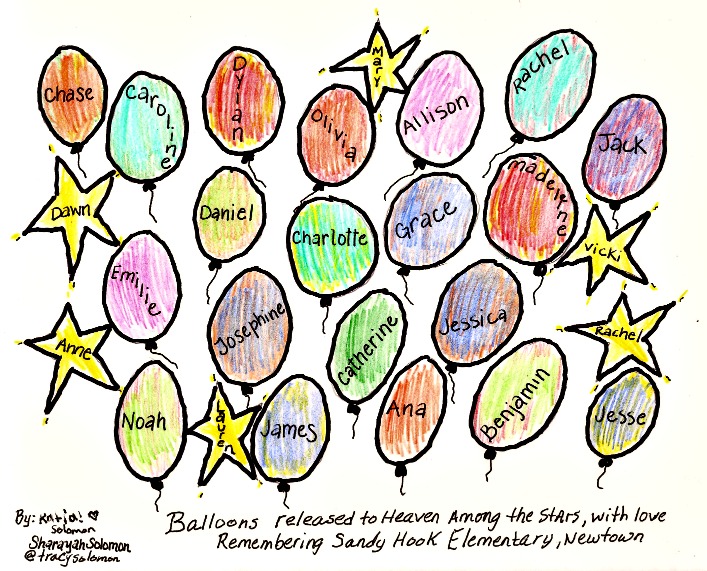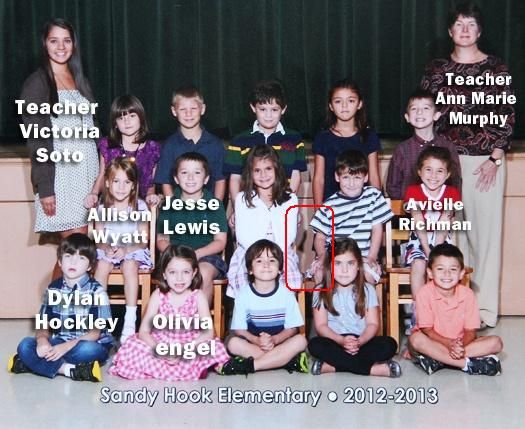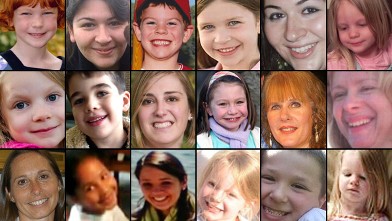Connecticut: Ley de control de armas pretende ser modélica a nivel federal
Connecticut Gov. Signs New Gun-Control Law
Verificación universal de antecedentes es ya requisito para la venta de armamento en Connecticut. Tambien aumenta el registro de armas, amplía la prohibición en el estado a las armas de asalto y vuelve ilegal, a partir de ahora, la venta de cargadores de más de diez balas.
 .
.


Fue necesaria la muerte de 20 niños en una escuela en Newtown, Connecticut, para que se diera esta ley. ¿Serán necesarias otras 50 carcinerías igualmente espantosas para que el resto de los Estados tomen medidas similares?
La Asociación Nacional del Rifle (NRA), piensa que la solución es dotar a todas las escuelas de guardias armadoso, sugerencia respaldada por muchos republicanos ... cuando salta a la vista que más armas solo empeorarán la situación.
Según cálculos estadounidenses oficiales, ocurren unas 85 muertes diarias a causa de disparos.
.

,
Obama promocionará en Connecticut proyecto para control de armas
08 Abril 2013 (PL) - Washington, Barack Obama, viaja hoy a la ciudad de Hartford, en Connecticut, para insistir en la promoción del proyecto federal de ley para el control de las armas de fuego en el país. Obama, quien defiende la compatibilidad entre un mayor control de estos letales medios y el derecho constitucional a poseerlos, está insistiendo a los legisladores del Congreso que voten a favor de la extensión de reforzar el tema de los antecedentes a todas las transacciones de armas.
.
Esta medida aparece incluida en la propuesta de ley presentada por los demócratas, la cual el Senado debatirá en el transcurso de esta semana.
En entrevistas para los espacios Fox News Sunday, de la cadena Fox y This Week, de ABC, el asesor presidencial Dan Pfeiffer aseguró la víspera que más del 90% de los estadounidenses respaldan la iniciativa de Obama para expandir estos controles, por lo que invitó a los republicanos a "subir a bordo" para lograr "medidas de sentido común".
.
Según el mismo programa de Fox el exrepresentante Asa Hutchinson, republicano de Arkansas, y actual director de la Asociación Nacional del Rifle (NRA), piensa que lo ideal para proteger a los profesores y estudiantes en las escuelas sería dotar de guardias armados a todos los centros escolares.
.
Sin embargo, Pfeiffer criticó esta sugerencia de la NRA, que está respaldada por muchos republicanos, con el argumento de que más armas solo empeorarán la situación.
.
El debate nacional sobre el control de armas alcanzó el nivel máximo a raíz de la masacre ocurrida el 14 de diciembre pasado en una escuela primaria de Newtown, Connecticut, donde fueron asesinados 20 niños y seis adultos.
"La extensión del control de antecedentes no impedirá que siga habiendo muertes por causa de las balas, pero evitará muchas", ha asegurado el gobernante demócrata.
Por eso, según dijo recientemente, "el Congreso debería votar a favor de una medida que defiende la mayoría de los ciudadanos, no importa de qué partido sean".
.
El miércoles 3 de abril, Obama visitó Colorado, un estado que según el gobernante "ha sufrido dos de las peores matanzas de nuestra historia, hace 14 años en este mismo mes, Columbine, y el año pasado en Aurora".
Cerca de 310 millones de armas de fuego se encuentran en inventarios privados de los estadounidenses y cálculos oficiales estiman un promedio de 85 muertes diarias a causa de disparos.

Gobierno de Connecticut aprueba nueva ley sobre control de armas
Connecticut ha promulgado una nueva ley de control de armas casi cuatro meses después de la masacre de la escuela primaria Sandy Hook en Newtown. La medida exige la verificación universal de antecedentes como requisito para la venta de armamento, aumenta el registro de armas, amplía la prohibición del estado a las armas de asalto y vuelve ilegal, a partir de ahora, la venta de cargadores con capacidad para más de diez balas. En la ceremonia de promulgación realizada el jueves, el gobernador Dannel Malloy definió a la ley como un modelo para los intentos de aprobar un proyecto de ley sobre control de armas a nivel federal.
El gobernador Dannel Malloy declaró: “Hemos unido fuerzas de una forma que pocos lugares de nuestro país han demostrado la capacidad de hacerlo. En algún sentido, espero que este sea un ejemplo para el resto del país, ciertamente para nuestros líderes políticos en Washington, que parecen estar tan divididos con respecto a la verificación universal de antecedentes, un asunto en el que la opinión pública no está dividida”.
El Presidente Barack Obama visitará Connecticut el lunes como parte de su intento de lograr apoyo público para el control de armas a nivel nacional.
.

 SANDY HOOK Newtown,Ct School Shooting 14 dec 2012 • Cluesforum.
SANDY HOOK Newtown,Ct School Shooting 14 dec 2012 • Cluesforum.
.
Newtown families voice support for gun control

The following script is from "12/14" which aired on April 7, 2013. Scott Pelley is the correspondent. Henry Schuster, producer.
"Newtown" is now synonymous with unimaginable tragedy. But many of the families who suffered through it call it something else,"12/14," the December day that they lost a son, daughter, or wife when a dark young man with dark dreams awoke, murdered his mother and drove to Sandy Hook Elementary School.
More from parents of Newtown victims

Nearly four months later, just last week, Connecticut passed a gun control law that expands background checks and limits ammunition magazines to 10 rounds. Tomorrow, these families will push for the same in Washington. They believe that their only chance is to keep the resonance of that date ringing. Something else we noticed about "12/14," add them together, and you get 26, the number of lives lost at Sandy Hook.
At the Newtown town hall we met seven families. They're part of a group called Sandy Hook Promise which works for change and remembrance.
Jimmy Greene: Our daughter, Ana was six years old. And in those six years, can look back and say it was an honor to know her. She taught me about how to love, how to give. She was beautiful and every day I cry.
Francine Wheeler: This is Benjamin Andrew Wheeler. Ben was six years old. He has a brother named Nate. And Nate was hiding when he heard Ben and his classmates and educators get shot.
Mark Barden: And we lost our sweet little Daniel Barden. He was known as the kid that would talk to somebody sitting alone. He was genuinely an old soul.
Nicole Hockley: This is Dylan. I think the picture kind of sums him up perfectly. He was always smiling and always laughing. And he was very pure. Possibly because of his age. He was six. And possibly because he was autistic.
Neil Heslin: I'm Neil Heslin, Jesse Lewis's dad. Jesse was six years old. He was my best friend and my buddy. He'd introduce himself as Jesse and Daddy. He was my whole life.
Bill Sherlach: Mary was the school psychologist at Sandy Hook Elementary School for 18 years and truly believed that that was the place that she was meant to be, doing what she could call "God's work."
Terri Rousseau: Lauren grew up with this idea that she wanted to be a teacher and work with other children. She had a sort of innocence about her, a kind of denial of all the ugly things in the world. We had no idea that some ugly thing would come and take her from us.
Those are memories Terri Rousseau, Mark and Jackie Barden, Nicole Hockley and others wanted state legislators to remember in Hartford.
Mark Barden: The lawmakers are going into their caucuses to discuss the legislation at hand. And the rope is there, I think, just to separate the various lobbyists who want to approach them as they go in there, as a last ditch effort to appeal to their cause. That's where we were.
Mark Barden: And we had a letter that we wanted them to read. And we had pictures of our children to give them a personal connection to why we're asking them to go in there and legislate.
Scott Pelley: Why the photographs?
Nicole Hockley: They need to not just look us in the eyes, but look our children and the lost ones and see those faces, see what's gone and remember this isn't just about political parties. This isn't just about careers. This is about people. And this is about making change to save people. And it's important to remember the people you are doing this for.
Scott Pelley: At one point a woman walked past. And as you were holding your cards of your children out she said, "No, thanks. All set."
Scott Pelley: And kept going by. Probably didn't know who you were.
Nicole Hockley: Probably not.
Scott Pelley: But I wonder how that feels.
Nicole Hockley: That is not a good feeling.
[Voice: I'm sorry for your loss.]

Nicole Hockley: Several of the caucus members, when they realized that we were people from Sandy Hook, the vast majority of them, and spoke to us and many of them were crying with us. They weren't being callous. They just didn't know who we were.
[Voices: My heart goes out to you... we just don't want this to ever happen again.]
Nicole Hockley: It was good that they listened to us and they made the time to hear what we had to say, and that it made a difference. It's made some changes. And that's what it's all about at the end of the day.
Scott Pelley: Mark, what in your estimation is the most important change that the legislature has voted for?
Mark Barden: The universal background check is very important. And to that point, I think Connecticut has done a wonderful job. They've worked very hard and they have passed almost everything that we were hoping they would. And they have done it in a bipartisan way, which I think is a great message to send out to the other states and to the federal government as they begin this process.
Scott Pelley: Mark singles out the universal background check. Does anyone else find another part of the law important?
Bill Sherlach: I think the idea of limiting the size of the magazines is critical.
Bill Sherlach's wife, Mary, tried to stop the gunman.
Bill Sherlach: You can have a million bullets, but if you have to put them in one at a time, the ability to do any kind of real damage is significantly reduced.
Scott Pelley: The legislature has decided to limit the size of magazines in Connecticut to 10 rounds. The gunman at Sandy Hook was using 30-round magazines. I've heard the argument made, "You can change these magazine clips in these rifles in a matter of two seconds. So what difference does it make?"
Bill Sherlach: Well, I mean, there was one instance where it wasn't two seconds. And it allowed 11 kids to get out of the classroom.
Scott Pelley: Tell me about that.
Bill Sherlach: It's just a simple arithmetic. If you have to change magazines 15 times instead of five times, you have three times as many incidents as where something could jam. Something could be bobbled. You just increase the time for intervention. You increase the timeframe where kids can get out. And there's 11 kids out there today that are still running around on the playground pretty much now at lunchtime.
Scott Pelley: Who escaped from these classrooms?
Bill Sherlach: Right.
Mark Barden: Another point on changing the magazines is the data that they used or that they'll tell you it takes two seconds or three seconds or however many. That's in a controlled setting. That's at a range. That's in the comfort of your home. When you're in that situation, if you want to picture yourself murdering children in a classroom, the police are coming in to kill you, and then you're about to commit suicide, your brain is in another place. You're not neatly and effectively changing that magazine.
Nicole Hockley: And when we looked at the search warrants as well, and know that he left the smaller capacity magazines at home, that was a choice the shooter made. He knew that the larger capacity magazine clips were more lethal.
David Wheeler: The more bullets you can get out the end of that gun in the least amount time, that is the single area that I believe affects lethality. And the size of the magazine placed in that weapon is a direct contributor to that--a direct contributor to that factor. There is a place for 30-round magazines, in the military, on the battlefield, at a range. If they stay at the range, they stay at the range.
These parents don't speak for all. There are different opinions.
But we asked David and Francine Wheeler, Jimmy Greene and Nelba Marquez-Greene to tell us what they've learned in four months.
Scott Pelley: Now, when I asked about the gun control legislation, you mentioned the background checks, you mentioned the high capacity magazines. But nobody has mentioned yet the idea of a ban on assault weapons of the kind that was used at the school. What do you think of that?
Nelba Marquez-Greene: At first, that was where my heart was. "We've gotta get-- you know, let's have a big bonfire and burn everything. Let's burn all these damn guns. I have since learned that it's a more complex issue than just saying, "Let's ban assault weapons." We're looking for real change and common sense solutions. Not things that just sound good.
Jimmy Greene: When we talk ban and confiscate, we-- it becomes a political argument. It's so much bigger than a political debate. It's so much bigger than Democrats versus Republicans, conservative versus liberals. I believe, in my humble opinion, this all transcends that.
Scott Pelley: What about the mental health care piece of all of this? What ideas, what thoughts do you have on that?
Mark Barden: I think mental health, brain health is paramount. It's just as important as everything else. It's just that, at this particular time, the focus on legislation is about the gun part of the issues.
Nelba Marquez-Greene: I'm not an expert on guns. But I am an expert in mental health. I'm a licensed marriage and family therapist. We need to put a lot more dollars behind our mental health system in America. I've had the benefit of practicing in another country for quite a while. And I can tell you that we're behind the curve on how we deal with mental health issues and family issues in this country.
Scott Pelley: Based on your expertise, what do we do wrong? Why do these people seem to fall through the cracks and not get caught by the system?
Nelba Marquez-Greene: I think one of the barriers or one of the challenges is that there's a whole lotta stigma attached to getting help. The fact that you have to go to a therapist or a psychiatrist or a psychologist, and then get a diagnosis for your child, that can be very humbling and scary for parents. I can't speak specifically for what happened with Adam Lanza and his family. As a mother, my heart breaks for Adam Lanza's mother.
Scott Pelley: We will never know with any precision what was happening in the Lanza home. But I wonder whether any of you blame Nancy Lanza. Is parenting part of this?
David Wheeler: It is obvious to anyone who looks and sees any of the information that's come out about that family, specifically Nancy and her son, that was anything but typical. It was like a set of dominos in many ways, just waiting for the first one to be tipped over. I think it's pretty obvious to anyone who looks, that something was very, very wrong in there
READ MORE
3
Watch the Segment »
Families of Newtown victims want the tragic memory of 12/14 - the date of the Connecticut massacre -- to spur new gun control legislation in the U.S. Scott Pelley reports.
Web Extras
Newtown families on gun control, part one
Newtown families on gun control, part two
Understanding autism and mental illness
.

Twenty bright first-graders were gunned down Dec. 14 at Sandy Hook Elementary School in Newtown, Conn. Six school staffers, including a teacher and a principal, also died. Click through to learn more about the victimsSandy Hook Elementary School.
.
Connecticut Gov. Signs New Gun-Control Law
Connecticut has enacted its new gun-control law nearly four months after the shooting massacre at Newtown’s Sandy Hook Elementary School. The measure requires universal background checks for all gun sales, increases gun registration, expands the state’s ban on assault weapons, and outlaws any new sales of magazines with more than 10 bullets. At the signing ceremony on Thursday, Governor Dannel Malloy called the law a model for stalled gun-control efforts at the federal level.
Gov. Dannel Malloy: "We have come together in a way that relatively few places in our nation have demonstrated an ability to do. In some senses, I hope that this is an example to the rest of the nation, certainly to our leaders in Washington, who seem so deeply divided about an issue, such as universal background checks, where the country is not divided itself."
President Obama is due to visit Connecticut on Monday as part of his efforts to drum up public support for gun control nationwide.

 .
.




